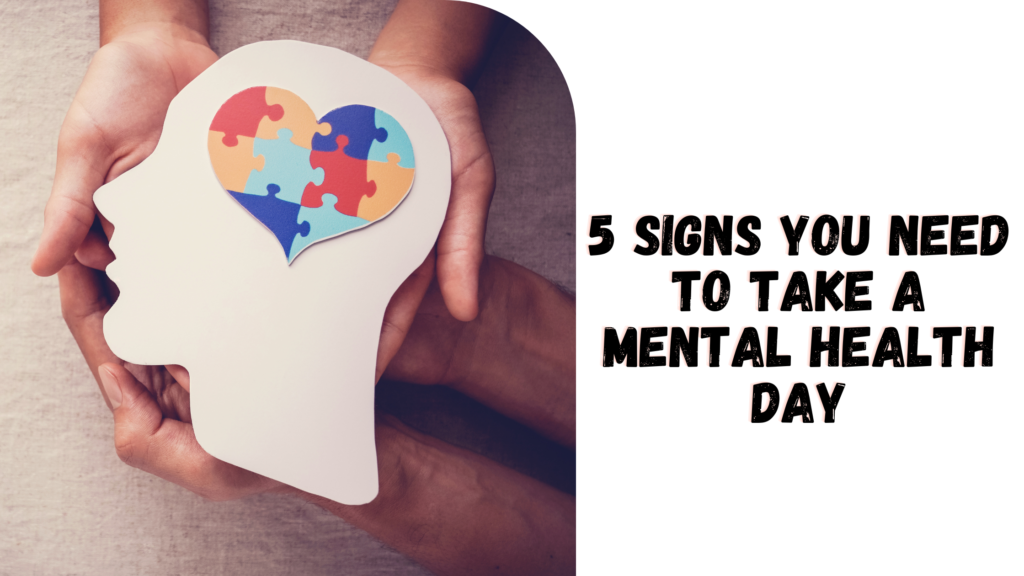
Table of Contents
Recognising Mental Exhaustion: 5 Signs for a Health Day
We’ve all been there. You wake up, and the weight of the world feels like it’s pressing down on your shoulders. Your coffee tastes more like despair than caffeine, and the thought of another day at work makes you want to hide under the covers. But is it just a case of “Mondays,” or is it something more? Let’s dive into the top 5 signs that it might be time to take a mental health day. And hey, if you recognise more than one of these signs, maybe consider booking a spa day too. Or at least binge-watching your favourite show with a tub of ice cream. No judgment here!
1. Constant Fatigue Despite Adequate Sleep
You’ve clocked in a solid 8 hours of sleep, but you still feel like you’ve been hit by a truck. Not just any truck, but a truck carrying a shipment of bricks… and maybe a couple of anvils for good measure. Constant fatigue, even after a good night’s sleep, is a clear sign that your body and mind are screaming for a break.
Real-life example: Remember Jane from accounting? She was always the first one in and the last one out. But one day, she started coming in with bags under her eyes, yawning every five minutes. She said she was sleeping well, but her body told a different story. She took a mental health day, spent it in a spa, and came back rejuvenated. Sometimes, it’s not about the quantity of sleep but the quality of rest your mind gets.
2. Decreased Motivation and Enthusiasm
When the things you once loved or were passionate about start feeling like chores, it’s a red flag. If you find yourself dragging your feet to do tasks that once excited you, or if the highlight of your day is the moment you can crawl back into bed, it might be time to hit the pause button.
Real-life example: Mike, a graphic designer, used to love creating vibrant designs. But over time, he lost his spark. Every project felt like a mountain to climb. After taking a mental health day, he rediscovered his passion by visiting an art gallery. Sometimes, all you need is a little inspiration and a break from the routine.
3. Increased Irritability and Short Temper
Are you snapping at colleagues for no reason? Did the printer jamming make you want to throw it out of the window? If you’re getting irritated by the smallest of things and your fuse is shorter than a candle in a windstorm, it’s a sign.
Real-life example: Sarah, a normally calm and composed manager, started lashing out at her team for minor mistakes. It wasn’t until she took a mental health day and went hiking that she realized she was burning out. Nature, fresh air, and a day away from screens worked wonders for her mood.
4. Difficulty Concentrating and Making Decisions
If you find yourself reading the same email five times and still not understanding it, or if choosing between tea and coffee feels like deciding the fate of the universe, your brain might be asking for a timeout.
Real-life example: Raj, a software developer, found himself staring blankly at his code, unable to debug a simple error. He decided to take a mental health day, during which he attended a meditation retreat. The clarity he gained helped him not only solve the problem but also approach tasks with renewed focus.
5. Physical Symptoms like Headaches or Stomach Issues
Sometimes, the mind manifests its distress through the body. Regular headaches, stomach issues, or even unexplained aches might be your body’s way of saying, “Hey, I need a break!”
Real-life example: Lisa, a schoolteacher, started experiencing migraines and digestive problems. After ruling out medical causes, she realised it was stress. A mental health day spent reading and relaxing in her garden alleviated her symptoms.
Conclusion on taking a mental health day
Taking care of your mental health is just as important as looking after your physical health. If you recognise any of these signs, don’t brush them off. Listen to your body and mind. And remember, taking a mental health day doesn’t mean you’re weak; it means you’re wise enough to prioritise your well-being. So, the next time you feel overwhelmed, don’t hesitate to take a breather. Your mind will thank you, and hey, your colleagues probably will too!
References
- Mind (www.mind.org.uk): Mind has resources that covers various aspects of mental health, including types of mental health problems, advice on treatments, everyday living tips, and stories from individuals experiencing mental health issues.
- The King’s Fund (www.kingsfund.org.uk): This website offers insights and resources on managing mental health and wellbeing. It includes various tools and advice for both individuals and teams in healthcare settings..
- Mental Health Foundation (www.mentalhealth.org.uk): This site offers a range of blogs and articles on different mental health topics.
FAQs
Q: Is it okay to take a mental health day even if I don’t recognise these signs?
A: Absolutely! Everyone’s threshold is different. If you feel you need a break, trust your instincts.
Q: How often should one take a mental health day?
A: It varies from person to person. Some might need it once a month, while others might find once a quarter sufficient. Listen to your body and mind.
Q: Can I take a mental health day even if my workplace doesn’t officially recognise it?
A: While it’s essential to follow workplace policies, your well-being comes first. Consider discussing your feelings with your supervisor or HR to find a solution.
THANK YOU
Thank you for dedicating your time to learning about Mental Health through our article; understanding such a critical aspect of mental health is indeed essential. We’re here to provide you with the information you need. We invite you to explore our diverse collection of Blogs posts for more insightful perspectives on topics that matter to you. From in-depth articles on health and wellness to enlightening pieces on current global issues, we strive to bring you content that informs, inspires, and engages.























































0 Comments